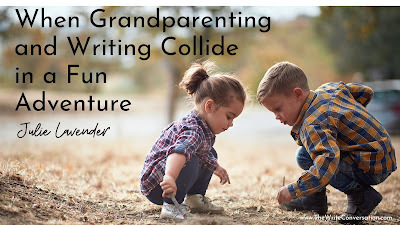Edie Melson's Blog, page 52
May 13, 2024
Encouragement for Living the Writing Dream

by Cindy K. Sproles @CindyDevoted
I've been a writer from an early age. My brother, twelve years older than me, was married when I was a third grader. My childhood was spent alone—no siblings to play hide-and-seek with, but valuable time with a vivid imagination instead. I think this is how many creatives are born. Alone with their imaginations make a wonderful playground.
Stories have always been an active part of my life. The problem was that no one else believed stories were as important as I did. "Go to college. Get a real job." Who hasn't heard that? That high school appointment you had with your guidance counselor before graduation turned into just that for me. "Cindy, get a real job. There's no money in writing for a living." Oh, did I mention that was the advice from the guidance counselor AFTER he stopped laughing? Best my memory serves, his last words were, "Writing is just a hobby. You can't make a living on a hobby—at least not a real one."
My naivety led me to believe that guidance counselor, so I put writing on the back burner. I got married, had babies, and changed my priorities. The babies came first, but this momma began to follow her dreams when the babies hit their senior year in high school.
My first conference was in 2002, and then it was six long years of learning. Rejections from every direction. Here's the sad thing. I acquired an agent on the coattail of a writer with whom I'd written a romance novel. That agent had turned me down on my own. I wondered if this writing thing was a dream or a farce, but because the agent already contracted my friend, to shop the novel, she had to sign me as well. I felt like I'd been in a mile relay, barely crossing the finish line. I didn't deserve a trophy, but I got a ribbon as a participation award.
The dream wasn't panning out like I'd hoped. Still, I kept up the work because I'm not a quitter. The lie happened when I began to believe I wasn't good enough to be an author. A dear friend and I stood at Blue Ridge, and I whined, "It's been eight years. I don't think I'll ever be good enough to be published."
"Do you really believe that?" She asked. Sadly enough, I was beginning to believe that lie. A reality check from this friend straightened me out, and off I went again.
I tell you this backstory because the writing dream is not an easy dream to follow. As you approach conference times nationwide, I want to offer you a few words of advice and encouragement.
6 Pieces of Advice for Writers When Discouragement Hits
1. Anything worth having requires hard work: I'm sure you've heard this adage. You may not find comfort or encouragement in it, but it's true. We live in a world where folks feel entitled. If success is not instantaneous, we get mad and stomp off, determined to "do it ourselves." The hardest thing for new writers to understand is that your first work is rarely your best, and "publication ready" comes with the price of hard work of learning the craft of writing.
2.The writing dream is filled with rejection: Could I be any more encouraging? You may not think so, but trust me, good things come to those who wait! (And yes, another cliché.) Again, both are true. I call it getting bloody knees. Because writing is a learning process, we'll meet rejection head-on. The question is, are you willing to persevere and do what you must to overcome rejection? It's important to remember that your rejections are not always because your writing is not ready. There are many reasons for rejection—from not following the submission guidelines to having a flooded market, so don't quit because you've gotten multiple rejections. Keep on keeping on. You know that the law of averages will eventually take hold, and suddenly, you will hit a landslide of acceptance. Sometimes, with trends fluctuating, you have to be at the right place at the right time. Keep at it.
3. Dreams tend to get shoved to the side by life: If you long to be a writer, fan the fire. Make sure you budget your time to include the dream of writing. This dream can quickly be snatched away by demands on your time.
4. Budget, Budget, Budget: Speaking of b-b-b-budgets. Not only do you need to budget your time, but learn to budget your money so you can attend a writers conference. Most conferences have their rates and dates available for the next year as soon as their conference for this year ends. Count the weeks until the next conference, divide that into the cost, and then set that number into your budget. Do without McDonald's or those cheesy magazines about celebrities. Skip bubble gum and chocolate. It's amazing how quickly you can meet your weekly amount by cutting out unnecessary items. You don't need Starbucks every day. Here's what I've found in working with people over the years. Folks find the money for the things they really want to do. You know this to be true. If it's something you want bad enough, you make a way. The same applies here. Learn to budget to gain the necessary training to follow the dream.
5. Have a teachable spirit and a willing heart: Don't rush success. Becoming a good writer happens quickly, but becoming an excellent writer takes time. Listen to those with the experience to help move you along in your career. Learn from those who have already walked the path. One thing I love about Christian Writers Conferences and their faculties is that they understand there is room for everyone. The godly side of this publishing ring is that well-seasoned authors want to see new writers succeed. That is why they give their time to attend conferences. If it depended on the time and expense of faculty members versus the pay they receive, we'd never have faculty members. Conferences can't afford to pay huge fees for faculty. So, when you meet with these wonderful folks, understand that they are there with you because they love influencing up-and-coming writers. They once stood in your shoes, and they want you to succeed. The finances never work out on paper, but God rarely writes on notepads. He just leaves the provision on the doorstep.
Writing is subjective, so learn and discern what works for you.
6. Don't quit: So many throw in the towel too soon. I've worked with several excellent writers who quit just as they teetered on the cusp of something big. Mary Kay Ashe, founder of Mary Kay Cosmetics, once said, "Much is lost except for just a little more hard work." Use discernment when you work hard and are on the cusp of success. Begin to pray that God will strengthen your spirit so that you can follow through. Ask for His blessing and for Him to send the right encouragement to get the lies out of your ear. Don't you dare quit! Quitting is unacceptable. Your time will come, but only if you persevere.
The people who lead the conferences you attend have sunk in hours of work, prayer, and skill to bring you to a place where you can be nurtured and learn. Their desire is what God has called them to do—serve.
I offer you the words of Eva Marie Everson from way back at my first conference. "Repeat after me. I am a writer. Now go and write." Live that dream.
TWEETABLEEncouragement for Living the Writing Dream from @CindyDevoted on @EdieMelson (Click to Tweet)
 Cindy K. Sproles is an author, speaker, and conference teacher. Having served for a number of years as a managing editor for Lighthouse Publishing of the Carolinas and Ironstream Media, Cindy now works as a mentor, coach, and freelance editor. She is the co-founder of Writing Right Author Mentoring Services with Lori Marett and she is the director of the Asheville Christian Writers Conference. Cindy is also the co-founder of Christian Devotions Ministries and WWW.CHRISTIANDEVOTIONS.US, as well as WWW.INSPIREAFIRE.COM. Her devotions are in newspapers and magazines nationwide, and her novels have become award-winning best-selling works. She is a popular speaker at conferences and a natural encourager. Cindy is a mountain girl, born and raised in the Appalachian mountains, where she and her husband still reside. She has raised four sons and now resorts to raising chickens where the pecking order is easier to manage. You can visit Cindy at WWW.CINDYSPROLES.COM or www.wramsforwriters.com.
Cindy K. Sproles is an author, speaker, and conference teacher. Having served for a number of years as a managing editor for Lighthouse Publishing of the Carolinas and Ironstream Media, Cindy now works as a mentor, coach, and freelance editor. She is the co-founder of Writing Right Author Mentoring Services with Lori Marett and she is the director of the Asheville Christian Writers Conference. Cindy is also the co-founder of Christian Devotions Ministries and WWW.CHRISTIANDEVOTIONS.US, as well as WWW.INSPIREAFIRE.COM. Her devotions are in newspapers and magazines nationwide, and her novels have become award-winning best-selling works. She is a popular speaker at conferences and a natural encourager. Cindy is a mountain girl, born and raised in the Appalachian mountains, where she and her husband still reside. She has raised four sons and now resorts to raising chickens where the pecking order is easier to manage. You can visit Cindy at WWW.CINDYSPROLES.COM or www.wramsforwriters.com.
Published on May 13, 2024 22:00
May 12, 2024
When Writers Need to Do Some "Spring Cleaning" on Their Manuscript

by Larry J. Leech II @LarryJLeechII
Spring cleaning. I have been aware of the name and of the concept for pretty much most of my life. But, down home, in Florida, I never cleaned in the spring.
If the driveway needed pressure-washed on December 15. Not a problem. Wash windows on January 3. Done. Fix a dead spot of grass in the yard on February 23. Sure. Let me run to Home Depot and get seed or a plug.
However, now the concept and the idea of spring cleaning makes more sense now that I have endured my a few winters in South Carolina. After months of cold weather, at least for me, stuff looks “dirty.” Thresholds need cleaned. Windows need washed. The list goes on and on.
All this got me to thinking the other day. We writers must “spring clean” our writing after pounding out the first draft. Just a word of caution, don’t spring clean (edit) during your first draft. Just get the story out.
Spring cleaning the second, third, fourth drafts, maybe more, entails a lot of things. Working on dialogue, making setting and description clearer, checking for those pesky “to be” verbs, getting rid of “that” as much as possible, eliminating qualifiers, such as “quite, very, so.” And let’s not forget crutch words, which are different for each person. Another that I see often in every manuscript is the word “it.” Just make sure you don’t overuse the word and that it’s properly used.
Those are just a few. Years ago, I created a list of words and phrases that hinder writing. I call this my Terrible 30. I work through this list every time I edit—either my own or for someone else.
I also look for two other “spring cleaning” issues.
Dialogue tags in direct address between two people:
“Mom, I don’t want to go to a private school,” Frank said, storming out of the room and yelling over his shoulder.” I want to stay in public school with my friends.”
Mom, hot on his heels, screamed back. “You’re going, Frank, and I don’t want to hear another word about it.”
In this example, you don’t need Frank or Mom in the dialogue. Both are just wasted words.
Also, tags at the end of dialogue that show intensity or tone. When the tag is at the end of dialogue, we don’t read the dialogue the way it was intended. For instance:
“I made a hole in one. I made a hole in one.” Andrew jumped up and down on the tee box, screaming.
When we put the tag first or early in the dialogue, we read it as intended.
Screaming, Andrew jumped up and down on the seventeenth tee box at TPC Sawgrass. “I made a hole in one. I made a hole in one.”
Hopefully, you “hear” the difference there.
If you have questions about spring cleaning, or if you would like my Terrible 30, feel free to contact me. I’d be glad to help you clean—your manuscript. I don’t do windows.
TWEETABLEWhen Writers Need to Do Some "Spring Cleaning" on Their Manuscripts from @LarryJLeechII on @EdieMelson (Click to Tweet)
 Editor-in-Chief at Bold Vision Books and writing coach of award-winning authors, Larry J. Leech II has spent more than forty years writing and editing. He started his career as a sportswriter in southwestern Pennsylvania where he covered prep, college, and pro sports, including the Pittsburgh Pirates and Steelers.
Editor-in-Chief at Bold Vision Books and writing coach of award-winning authors, Larry J. Leech II has spent more than forty years writing and editing. He started his career as a sportswriter in southwestern Pennsylvania where he covered prep, college, and pro sports, including the Pittsburgh Pirates and Steelers. In 2004, after 2,300 published articles, Larry moved into the book publishing industry. Since that time, he has ghostwritten 30 books, edited more than 400 manuscripts, and coached hundreds of authors through the writing and publication process. You can find him online on Twitter, Facebook, and Instagram.
Published on May 12, 2024 22:00
May 11, 2024
Writing through Life’s Changes

by Martin Wiles @LinesFromGod
When the phone rang, cold chills slithered down our spines like sap down a tree.
My wife talked with her mom nightly, but an 8:30 a.m. call one Sunday rattled us. My father-in-law had fallen several months before and broken his hip. Surgery followed, along with several weeks of rehab. And all of this during a surge in COVID cases in our area—including the rehab center where he spent a few weeks. He missed being home, and my mother-in-law missed him being there. More than sixty years of marriage had cemented their love.
After weeks of rehab, therapy, and home health care, the doctor released him. Best of all, he could drive again. But that only lasted a few days.
“The ambulance is pulling out of the driveway with your daddy,” my mother-in-law said when my wife answered the phone. “When I checked on him this morning, he was green and gasping for air.”
We feared a heart attack, but we also feared COVID. What had been a nagging cough when he came home from rehab turned into a severe case of pneumonia in one lung—so severe that nurses placed him on the highest dose of oxygen short of a ventilator.
My wife or her brother took my mother-in-law to the hospital daily for a brief visit. Overnight, life changed for my in-laws, and it kept changing. My father-in-law couldn’t shake the oxygen and eventually entered congestive heart failure. In what seemed like a moment, he was at the local Hospice house . . . and then gone. Three years later, my mother-in-law was living with us.
I’ve experienced overnight changes myself. One day fine, and the next in the hospital with a bleeding ulcer. One day riding a bike, and the next wearing a sling because of a fractured elbow from a bicycle accident. One day having a retirement nest egg, and the next having none. One day having a job, and the next facing unemployment.
Sometimes, these life changes also challenge our writing journey. We shouldn’t stop writing—we often find the best stories in those difficult times—but we might have to alter it a bit. Not writing daily for a time doesn’t disqualify us from the writing world or mean that we are no longer a “real” writer. Some writers don’t write daily, even in the easy times. Occasionally, we might even need a short sabbatical. But we can’t get so discouraged that we give up and walk away. We must write in some fashion through life’s changes.
God will sustain us when life changes, as He did the psalmist. “Lord, sustain me as you promised, that I may live! Do not let my hope be crushed” (Psalm 119:116 NLT).
We don’t have to worry about God doing His part. He promises to care for His children. And God’s as good as His word. The care may not come as we expect or desire, but God knows our needs better than we do. He also knows His grand plan for us, including the one that relates to our writing journey.
Our part involves trusting and believing. Whenever something happened to my father-in-law, my mother-in-law reassured my wife, saying, “Your daddy is gonna be alright.” And he was. Not in the way we all wished for, but in the way God willed, which for my father-in-law meant streets of gold where a bum leg and a bad heart wouldn’t bother him anymore.
When life changes, we will be fine, too, if we’re connected to the One who maps out our life plan. And so will our writing journey, even if it looks slightly different than it once did.
Don’t let life’s changes destroy your writing life. Instead, let them enrich the journey.
TWEETABLEWriting through Life's Changes - from author Martin Wiles (@LinesFromGod) on @EdieMelson (Click to Tweet)
 Martin Wiles is the founder of Love Lines from God (WWW.LOVELINESFROMGOD.COM) and serves as Managing Editor for Christian Devotions and Directing Editor for VineWords. He has authored six books and has been published in numerous publications. His most recent book, DON'T JUST LIVE...REALLY LIVE, debuted in October of 2021. He is a freelance editor, English teacher, author, and pastor.
Martin Wiles is the founder of Love Lines from God (WWW.LOVELINESFROMGOD.COM) and serves as Managing Editor for Christian Devotions and Directing Editor for VineWords. He has authored six books and has been published in numerous publications. His most recent book, DON'T JUST LIVE...REALLY LIVE, debuted in October of 2021. He is a freelance editor, English teacher, author, and pastor.
Published on May 11, 2024 22:00
May 10, 2024
What Happens When Writers Think Like Stand-Up Comedians

by Beth K. Vogt @BethVogt
My husband and I opened our Christmas presents last weekend.
You read that sentence correctly. This past Christmas, we gifted ourselves tickets to see comedian Nate Bargatze perform at the Broadmoor World Arena in Colorado Springs, CO on Saturday, May 4, 2024.
Merry Christmas to us.
The arena can seat over 9,000 people. That night, the only other person I knew was my husband, Rob. Everyone was there for the same reason: to laugh at Bargatze’s jokes.
And sitting there laughing with all those strangers got me thinking about writing.
Of course it did.
My husband and I bought tickets month ago for Bargatze’s show. Saved the date on our calendar. Anticipated our night out. Arrived early and stood in line to get in, even though we had reserved seats. We laughed nonstop for two hours, including Bargatze’s warmup acts. And yes, we tolerated the horrendous traffic after the show while we talked about the all-new routine Bargatze performed and listened to some of his old comedy on my phone—even though we’d just seen the guy live!
We know Bargatze as a comedian, and he did not disappoint. He delivered his trademark low-key, clean, self-deprecating, geared-to-real-life humor.
That’s what you expect from Nate Bargatze comedy.
See where I’m going with this?
One of the best definitions for writer’s voice is “Personality of the page.” Look back a few lines because I described Bargatze’s comedic voice to you:Low-keyCleanSelf-deprecatingReal-life
He reinforces his comedic voice with how he dresses: casual jeans, tennis shoes, a T-shirt, and a jacket of some sort, usually a jeans jacket or a baseball style jacket.
Your writer’s voice is your personality on the page. With every manuscript you write, every book you publish, you develop your writer’s voice, your individuality. Your plots change, but your voice doesn’t.
My husband and I went to the World Arena last weekend expecting to see Nate Bargatze and to hear his brand of humor. If he’d come out dressed in a three-piece suit, we would have been a little confused. But if he’d changed up his routine and told some off-color jokes or been rude, we would have been completely disappointed. I think a whole lot of people would have left wondering, “What was that?!”
Think about this for a moment.
Your readers learn your writer’s voice. Not only that, but they also come to expect it. When my readers pick up one of my novels, they are listening for my voice. A Beth K. Vogt book includes themes of family and threads of humor and clean romance and yes, faith—but I always say I don’t like to interrupt your regularly scheduled reading for the faith message.
Think like your favorite comedian for moment—what you like about them, what keeps bringing you back to them—how they do humor. Now imagine yourself center stage, just like your favorite comedian.
What’s your performance like? Who are you?
Translate that to your writing—what’s your writer’s voice?
TWEETABLEWhat Happens When Writers Think Like Stand-Up Comedians - @BethVogt on @EdieMelson (Click to Tweet)
 Beth K. Vogt believes God’s best often waits behind the doors marked “Never.” She’s authored 15 novels and novellas, both contemporary romance and women’s fiction. Beth is a Christy Award winner, an ACFW Carol Award winner, and a RITA® finalist. Her newest contemporary romance novel, Dedicated to the One I Love, released June 20, 2023. Her novel Things I Never Told You, book one in her Thatcher Sisters Series by Tyndale House Publishers, won the 2019 AWSA Golden Scroll Award for Contemporary Novel of the Year. An established magazine writer and former editor of the leadership magazine for MOPS International, Beth blogs for Learn How to Write a Novel and The Write Conversation and also enjoys speaking to writers group and mentoring other writers. She lives in Colorado with her husband Rob, who has adjusted to discussing the lives of imaginary people. Connect with Beth at bethvogt.com.
Beth K. Vogt believes God’s best often waits behind the doors marked “Never.” She’s authored 15 novels and novellas, both contemporary romance and women’s fiction. Beth is a Christy Award winner, an ACFW Carol Award winner, and a RITA® finalist. Her newest contemporary romance novel, Dedicated to the One I Love, released June 20, 2023. Her novel Things I Never Told You, book one in her Thatcher Sisters Series by Tyndale House Publishers, won the 2019 AWSA Golden Scroll Award for Contemporary Novel of the Year. An established magazine writer and former editor of the leadership magazine for MOPS International, Beth blogs for Learn How to Write a Novel and The Write Conversation and also enjoys speaking to writers group and mentoring other writers. She lives in Colorado with her husband Rob, who has adjusted to discussing the lives of imaginary people. Connect with Beth at bethvogt.com.
Published on May 10, 2024 22:00
May 9, 2024
When Opportunity Knocks for a Writer

by Lilka Raphael @Lilka_Raphael
A successful writing career requires patience and persistence. It also requires that a writer maximize every opportunity that comes to call. The adage, “Opportunity only knocks once,” is not necessarily true. However, it may not knock as loudly when it returns. As writers, achieving our goals challenges us to anticipate opportunity and prepare for its arrival.
Preparation requires that we keep writing when we feel uninspired. It is incredibly easy to find reasons not to write. There are so many things that vie for our attention. Death by distraction probably kills opportunity quicker than anything else. Yet, diligence entices opportunity. The resolve to keep writing and allow submission guidelines to influence what we write may not open a door, but it can crack it. We can stay true to our voice while considering the marketability of our work and the audience for our words.
Opportunity also requires that we remain available. It doesn’t linger and easily finds another writer eager to answer the call. We make ourselves available by connecting with mentors, authors, critique groups, and writing communities. My inbox overflows with writing prospects and resources daily. Not all of them are not suited for me. However, I forward those emails to other authors. When we refer information to others, they often reciprocate and share opportunities in return. Likewise, my mentors challenge me to step up and walk through doors my introverted self would never dream of approaching. Get connected and stay connected. Word Weavers International, 540 Writers Community, blogs, conferences, and their affiliated websites are fantastic ways to develop relationships with writers who are enthusiastic about the profession and are willing to share their knowledge.
Winston Churchill acknowledged that, “A pessimist sees the difficulty in every opportunity; an optimist sees the opportunity in every difficulty.” If God provides an occasion to present our work or minister with our words, it is deliberate. When compelled to complete a task, our Father equips us with the talent and resources to do things that appear impossible. I enjoy writing devotions. However, I never considered writing a devotional until someone suggested it. When asked to write something you wouldn’t typically consider, do not presume you are not qualified. Your peers and acquaintances may recognize talents you have yet to appreciate or develop. Prayerfully consider every request or suggestion presented to you.
Lastly, opportunity requires that we go in the strength that we have. And we may have to do it afraid.
The Lord is with you, you mighty man of valor! Judges 6:12 NKJV
This was true for Gideon, and it is true for us as well. Our Father promises to be with us and help us to accomplish the things He calls us to do. Amplify your faith and answer the call you mighty writer. God reassured Gideon repeatedly and He encourages us through ideas, dreams, and advice from other people. Gideon had his assignment, and we have ours.
When opportunity knocks, we should be prepared, courageous, and go in the strength that we have.
TWEETABLEWhen Opportunity Knocks for a Writer from @LilkaRaphael on @EdieMelson (Click to Tweet)
 A Florida native, Lilka Finley Raphael has been a licensed pharmacist for over thirty years. Her passions for writing, gardening, and photography prompted her to share her experiences and life lessons on her blogs B Is for Blessed and God, autism, & me. You can learn more about her at lilkaraphael.com
A Florida native, Lilka Finley Raphael has been a licensed pharmacist for over thirty years. Her passions for writing, gardening, and photography prompted her to share her experiences and life lessons on her blogs B Is for Blessed and God, autism, & me. You can learn more about her at lilkaraphael.comLilka’s greatest achievements are her two adult sons who have flown the nest. Happily married for thirty-two years, she lives east of Atlanta with her husband, Rod. They now share their home with two German Shepherds—Holly and Ivy—and one naughty kitty, Moxie.
Published on May 09, 2024 22:00
May 7, 2024
Why Writing Articles is a Smart Career Move for Writers

by Linda Gilden @LindaGilden
So, why are articles important to your writing career?
I don’t know I’ve ever been asked that question before. However, there are many answers to that question.
When I first began to write articles, I had a very practical reason. My three children were small and really didn’t like taking naps. I grabbed every spare minute I could to pursue my writing career. I wrote in my head while I did laundry, changed diapers, and played Candy Land. Then when the children finally got tired, I put them down for naps and used that fifteen minutes or so to transfer words from my head. Articles seemed the logical way to go because they took a shorter time to write. Sometimes it took more than one nap but I could usually complete an article in three naps or so.
So back to the original question. Why articles?
You learn a lot writing articles. No matter how short your article, you will most likely have to do some research about your question. Not only will that provide new sources of education for you but it will also likely give you some ideas for other articles on related subjects. Often once you write an article on a specific subject that the editor likes, you may be invited to write another on a related subject.
Several years ago an editor called and asked if I could write an article on family reunions. It was summer and certainly reunion season. I had written a number of articles over the years for this publication, and he thought my style would be a good fit for this subject. The first article I did was titled something like “Planning a Successful Reunion.” The editor loved it and asked if I could write about anything else related to family reunions. I offered him “What to do With the Children at a Family Reunion,” “Planning a Get-to-know you time at Family Reunions,” and several other options. From that one bit of research, I was able to write and sell four or five articles. I also learned that a university in Pennsylvania had a masters in Family Reunions. I talked to the author who wrote the foreword for the textbook and learned a lot from her.
Articles are very helpful to build your platform and every time your name appears on an article your recognition increases with the readers of that publication. If they like your writing, which of course if you have done your best they will, they will begin to look for your name in other magazines they read. Use every opportunity y to make people aware that you are an excellent writer.
Articles make a great side hussle while you are getting your writing career off the ground. In the beginning your goal may not be to make money but just to get your name out there and add credits to your writing repertoire. Everything you write will add ways you gain recognition as a writer.
When you see a new publication that has come on the market, you might want to try it out. A good way to do so is to write a short article. First, go through the magazine and see what its style is like. Then if you think it is a good fit, you can write an article to see if the editors agree. It is always good to write for an editor of a new magazine and get on their list of writers they like.
No matter what your reason (and there are many more) for writing articles, it is a good first step in your writing career. You will not only enjoy the writing, but you will also enjoy meeting new publishers and learning new markets to write for.
Good luck with your article writing. If you know a publication that is just getting started or who has a new editor, would you share it with the rest of us in the comment section. We can help each other take new steps in our writing. Happy writing to all!
TWEETABLEWhy Writing Articles is a Smart Career Move for Writers from @LindaGilden on @EdieMelson (Click to Tweet)
 Linda Gilden is an experienced, bestselling writer, speaker, award-winning editor, marketer, and speaking coach, ghostwriter, and writing coach. Author of 40 books and 2,000+ magazine articles, Linda appreciates a great story. She believes with our stories, we can change the world one word at a time and loves to encourage others to do that through writing coaching and personal tutoring. Her newest book was released in November: TRADING SHADOWS: EXCHANGING A LIFE OF SECRETS, FEAR, AND DOUBT FOR A LIFE OF FREEDOM WITH THE ALMIGHTY.
Linda Gilden is an experienced, bestselling writer, speaker, award-winning editor, marketer, and speaking coach, ghostwriter, and writing coach. Author of 40 books and 2,000+ magazine articles, Linda appreciates a great story. She believes with our stories, we can change the world one word at a time and loves to encourage others to do that through writing coaching and personal tutoring. Her newest book was released in November: TRADING SHADOWS: EXCHANGING A LIFE OF SECRETS, FEAR, AND DOUBT FOR A LIFE OF FREEDOM WITH THE ALMIGHTY.
Published on May 07, 2024 22:00
When Grandparenting and Writing Collide in a Fun Adventure

by Julie Lavender @JLavenderWrites
Isn’t grandparenting the best? (And for those of you who haven’t experienced this treat from God, why not borrow a dear friends grandchild and experience some of the joy yourself?) My husband and I love every adventure with our only grandchild thus far, but we especially love when our professional lives collide with Benaiah‘s little world.
On a recent visit to catch our five-year-old grandson’s baseball game, our son-in-love found out that Wednesday was insect day for letter I in his son‘s pre-K classroom. Before getting our hopes up, Adam texted the teacher, pointed out that Benaiah’s grandfather was an entomologist, and asked if she would like for him to come speak to the class.
Apparently, she first looked up that word, and then responded to Adam with a resounding “yes”.
We weren’t as prepared as we could have been, but we went into action immediately for the event just two days away. At the park, we caught six ladybugs. Under the back porch, David collected spiders to point out the difference between an eight-legged critter and a six-legged one. And he scooped up two bees in the backyard.
I rounded up some of Benaiah‘s insect books we’d had gifted him previously. And with the help of my Heavenly event planner whom nothing surprises, I made plans to wear the dragonfly shirt I just happened to have in my suitcase.
When the day arrived, we joined Benaiah for lunch and snacked on pizza and a chicken patty. (I say snack, because in order to fit in everyone’s lunch, his class visits the cafeteria by 10:25, and our portions were rather small but yummy!) After tossing trash and returning trays and a quick bathroom visit for all of the kids, twenty excited four- and five-year-olds gathered on the carpet at the front of the classroom.
David shared insect facts in little-people language and then identified and discussed the insects kids brought for show and tell. He gently pointed out that roly-polies, otherwise known as pill bugs, are not actually insects and neither were the worm and three spiders. He also discussed the one ant left in the container with the loose lid, as we all wondered where the second one had ventured to!
Next, I read insect books to eager listeners. I took the opportunity to remind kids that Mr. Lavender had to learn all about insects before he started work as an entomologist.
“One way Benaiah’s granddaddy learned about insects was by reading lots of books,” I proudly told them. “And guess what, boys and girls? I’m a writer, and I love writing books for kids to help them learn. Mr. Lavender and I wrote four books about animals that might be in your library one day.”
The kids were abuzz by the time we finished our presentation, just in time for recess.
The kids who brought in critters carried their jars and containers to the playground, and we released their treasures back into the wild. Fascinated students spent more time with crawling and flying insects than slides and swingsets.
Benaiah’s teacher and I chatted as we watched the kids’ buggy adventures. She asked for details about my upcoming books, explaining, “The librarian often asks us for book recommendations.”
I shared the name of the educational company publishing our animal books and also told her about my picture book, A Gingerbread House, releasing from End Game Press. She took notes on her phone and promised to tell the librarian. My a few words to five-year-olds took flight, and on a wing and a prayer, copies of my books just might find a home in my grandson‘s school library.
I’m not sure who had more fun in the classroom that morning, but I’m pretty sure it was the visiting entomologist and writer. I’m glad our professional lives collided with those enthusiastic five-year-olds.
Do you have a favorite story of a time when your writing life collided with a grandchild’s life? Will you share it with us below?
TWEETABLE
 Julie Lavender is excited that her children’s books release this fall, a children’s picture book with End Game Press and four educational children’s books co-authored with her husband. She’s also excited about the release of two books since October: the bilingual edition of her award-winning, Amazon bestselling, Children’s Bible Stories for Bedtime; andStrength for All Seasons: A Mom’s Devotional of Powerful Verses and Prayers.
Julie Lavender is excited that her children’s books release this fall, a children’s picture book with End Game Press and four educational children’s books co-authored with her husband. She’s also excited about the release of two books since October: the bilingual edition of her award-winning, Amazon bestselling, Children’s Bible Stories for Bedtime; andStrength for All Seasons: A Mom’s Devotional of Powerful Verses and Prayers.
Published on May 07, 2024 22:00
May 6, 2024
Meddling In The Messy Middle of Your Manuscript

by PeggySue Wells @PeggySueWells
In the 2011 Winnie the Pooh film there is an insider snippet just for writers. It goes like this.
Pooh, Rabbit, Owl, Eeyore, Kanga, and Roo are stuck in a hole, while Piglet is outside of the hole.Rabbit to Piglet: Go look for something to get us out of here!Piglet: [Hiding under a teacup] B-b-b-b-b-b-but-okay. There m-m-m-might be something over by the pack. [Piglet leaves] sighs: Thank goodness one of us is up there. I was worried we'd be stuck here forever.: I found something! [Returns with a flower] Here!: What?: Ooh, well, that's a lovely flower, Piglet.: Yeah, I thought so, too.: Yes, Piglet, it-it's very nice... perennial. But I think we need something longer.: Longer? Of course. How silly of me. [Giggles and leaves again.Returns with a large book]: Oh, good thought, Piglet. But you can't possibly think that that's long enough.: Oh, yes, it is. Uh, Owl read this to me once and it was certainly the longest thing I've ever heard. [The book falls into the hole and lands on Pooh's head.]: It's true, Rabbit. It lags a bit in the middle.
The messy middle describes that section of the book between the first act, when a writer is fueled with the potential of the story, and the final act when the challenging part is behind as you tie up the loose ends in surprising ways for a satisfying ending.
Generally, a story can be divided into three sections. Act one is the beginning quarter and act three is the final one-fourth. In the middle half, act two of the manuscript, the author
further develops the charactersprevents the character we care about from achieving their goalintensifies the suspensesets up the resolution of act three with an explosive moment that has been building
The middle is the proving ground for the length of a story. If your novel lags in the middle, is the manuscript better suited as a novella, short story, or included in an anthology?
To cure a lagging middle, heighten the suspense. The middle of the story is best characterized by rising action that culminates in the climax. Conflict creates tension and tension supplies suspense.
Increase the stakes. In Chasing Sunrise, not only is the category 5 Hurricane Hugo bearing down on St. Croix, but killers have come to the island, and a deadly virus is about to be released. Put more blocks between the character and the achieving of the character’s goal. In Homeless for the Holidays, the Baker family will lose everything if Jack can’t get a job. When the news channel runs a negative story about Jack, complete with photo, no one in town will hire him. Maximize the number of people affected by the character’s success or failure. In The Patent, if Marc Wayne fails to outsmart his kidnapper, World War 3 will begin and America’s enemies will be militarily invincible. Create a midpoint reversal. In the film, Fools Gold, the writers brilliantly cause surprising reversals of who is the antagonist and who are on the side of the good guys. Give the main character a crisis where they find within themselves the qualities needed to confront the problem. In the Avengers film, Endgame, Tony Stark finds the key to bring back the 50 percent of the world’s population who have disappeared. And the task will probably cost him his life.Drop the character into their lowest point where they realize they do not have what is needed to solve the problem. Despite fierce fighting, the Gondorians look like they will lose the great battle to the evil Sauron in The Lord of the Rings: The Two Towers. This scenario sets up the main character to be reinforced by the proverbial calvary as when Gandalf and the Riders of Rohan arrive at Helm's Deep to turn the tide of battle.
The middle of the story must grab the reader’s attention or they might put the book down before discovering the exciting ending. Energize the messy middle with action, betrayal, complications, crisis, setbacks, and startling revelations. Compel readers to keep turning pages by giving them reason to care about your character and what happens next.
TWEETABLEMeddling In The Messy Middle of Your Manuscript - @PeggySueWells on @EdieMelson (Click to Tweet)
 PeggySue Wells is the bestselling author of 40 books and collaborator of many more. Action and adventure, romantic suspense, military romance, and cozy mystery are the page-turning novels by P.S. Wells, including Homeless for the Holidays, Chasing Sunrise, The Patent, and Unnatural Cause. How to live better, easier, and simpler is the focus of her nonfiction including The Ten Best Decisions A Single Mom Can Make. Founder of SingleMomCircle.com, PeggySue coaches writing and speaks at events and conferences. When not writing, she parasails, skydives, snorkels, scuba dives, rides horses, and has taken (but not passed) pilot training. Connect with her at www.PeggySueWells.com, on Facebook at PeggySue Wells, and LinkedIn at linkedin.com/in/peggysuewells
PeggySue Wells is the bestselling author of 40 books and collaborator of many more. Action and adventure, romantic suspense, military romance, and cozy mystery are the page-turning novels by P.S. Wells, including Homeless for the Holidays, Chasing Sunrise, The Patent, and Unnatural Cause. How to live better, easier, and simpler is the focus of her nonfiction including The Ten Best Decisions A Single Mom Can Make. Founder of SingleMomCircle.com, PeggySue coaches writing and speaks at events and conferences. When not writing, she parasails, skydives, snorkels, scuba dives, rides horses, and has taken (but not passed) pilot training. Connect with her at www.PeggySueWells.com, on Facebook at PeggySue Wells, and LinkedIn at linkedin.com/in/peggysuewells
Published on May 06, 2024 22:00
May 5, 2024
Don't Neglect Social Media Before and During Your Next Writing Conference

by Edie Melson @EdieMelson
We are well into the spring season of Writing Conferences. Writers everywhere are returning and/or making plans to attend writing conferences. But in the midst of your preparation, be sure not to miss out on valuable connections that can more than double what you get out of these events.
Many writers have the mistaken idea that social networking is only beneficial online. Or that it only helps when you can’t be at an event. Not true.
While it’s true that social networking can help you plug in when you’re not at a conference or event—many miss the benefits of networking online before and during the conference.
Here are just a few of the benefits you’ll find:The ability to connect with others who’ll also be attending the conference. This can make coming to a huge event more like a reunion than a reason for anxiety medicine.The chance to find out what industry professionals are looking for in advance. It can also give you the opportunity to find out the way the interact with others and even some of their pet peeves.The opportunity for the faculty, staff, and other attendees to get to know you in a positive way. If you take the time to introduce yourself online and interact, you can already be ahead of the game when it comes to being remembered after the conference is over.The inside scoop. It’s an unwritten rule that the bigger the conference, the more last minute changes occur. You can be one of the first to know what’s happening and already have a plan in place before most of the attendees know what’s happening.So how do you make these valuable pre-conference connections? There are several ways and I recommend you use as many as you have time for. Not everyone is on all the social networks, so utilizing more than one can give you better results.
The very first place to start is on the conference website. As a conference director myself, I’m always amazed at the number of people who don’t take advantage of the resources we have on our site. It will definitely make you stand out in a good way if you take the time to read the info on the site.
So what info is valuable for social networking?First and foremost the conference blog. Frequently there’ll be guest posts from faculty with extra, valuable information. There also may be posts about the culture of the conference. By that I mean the expectations of those on staff and attending. What is the expected attire of attendees, are there any special events that require or expect attendees to dress up, even how many people will be there.e-Loops. These are email loops that provide the opportunity for attendees to interact with each other and/or the staff and faculty. Some conferences have different loops for different genres, others have one general loop, and still others offer something for first-time attendees. You’ll never know what’s available unless you look.Conference Facebook Page and/or Group. This is another opportunity to connect with attendees and faculty. Be sure to Like the page to take advantage of all the networking options.Conference Twitter Account. This is a great account to follow on Twitter because of the information that can be gleaned. You’ll also be able to find out what the conference #Hashtags are. (A hashtag is a number sign in front of a group of letters, numbers, and/or words. There are no spaces within a hashtag and this designation makes the hashtag searchable anywhere within the Twitter universe.)Faculty Page on the website. On this page you should be able to find the websites and blogs of the faculty. Or, if they’re not listed, you’ll at least get the correct spelling to make your own research easier.
So once you’ve exhausted the info on the conference site, then what? Why it’s on the faculty and staff. Here’s what to look for:
Blogs and Websites: I start here because this is where most people go to find out about the faculty of a conference. Read the blogs and leave comments. The comments section is also a good place to eavesdrop and find other commenters who’ll be attending the conference.Facebook: Most people who have a blog have a way to connect with them on Facebook there. I don’t recommend you make professional relationships by friending someone (requesting they become your friend on Facebook). It’s better to let the professional take your online connection to the next level. So Follow their personal page or Like their professional page. You can comment on things they post there and continue the conversation you started on their blog. Once again, don’t neglect to notice who else is on there and whether or not they’ll be attending the conference.X (Twitter): With Twitter, the etiquette is slightly different so it’s a good idea to find all the faculty and Follow them on Twitter. It’s always a compliment to be mentioned on Twitter, so spread the word about blog posts and comments that have helped you.Instagram, Pinterest, LinkedIn, etc: All of these are good secondary routes to network prior to a conference, but I recommend them as a second line strategy rather than the first things you go to.While You’re at the ConferenceNot all the value of social media occurs before the event. Social media is a great way to share the experience with tweeting and sharing pics on Facebook and Instagram.It will also cement you as one of the crowd, when sharing valuable quotes from others at the conference.As mentioned above, most events have an event hashtag and by following it, you can stay up-to-date with any schedule changes or announcements.You can also follow new contacts on social media while you’re with them at the conference.
While all of these things take time, they can exponentially increase the value of a single event. You’re spending good money to go a conference, take the time to get everything you can from it.
What tips have you found for using social media to get more value from a writing conference? Be sure to share your thoughts in the comments section below.
Don't forget to join the conversation!Blessings,Edie
TWEETABLEDon't Neglect Social Media While Prepping for a Writing Conference from @EdieMelson (Click to Tweet)
 Edie Melson is a woman of faith with ink-stained fingers observing life through the lens of her camera. No matter whether she’s talking to writers, entrepreneurs, or readers, her first advice is always “Find your voice, live your story.” As an author, blogger, and speaker she’s encouraged and challenged audiences across the country and around the world. Her numerous books reflect her passion to help others develop the strength of their God-given gifts and apply them to their lives. Connect with her on her website, through Facebook, Twitter and on Instagram.
Edie Melson is a woman of faith with ink-stained fingers observing life through the lens of her camera. No matter whether she’s talking to writers, entrepreneurs, or readers, her first advice is always “Find your voice, live your story.” As an author, blogger, and speaker she’s encouraged and challenged audiences across the country and around the world. Her numerous books reflect her passion to help others develop the strength of their God-given gifts and apply them to their lives. Connect with her on her website, through Facebook, Twitter and on Instagram.
Published on May 05, 2024 22:00
May 4, 2024
Masterpiece Moments: Walking & Writing Through Life with Eyes Open

by Edie Melson @EdieMelson
This is the Lord's doing; it is marvelous in our eyes. Psalm 118:23
Sometimes everything comes together—the colors, the lighting & the composition. You don’t have to have fancy equipment to capture a masterpiece. This was snapped in a parking lot with my iPhone 11 Pro Max. Capturing beauty isn’t about the equipment, it’s about the attitude.
I see this in life as well. We (or at least I) work hard to orchestrate special times. I plan and prepare and sometimes those times turn out well. But most of the masterpiece moments in my memory aren’t built from the ground up, they’re discovered.
As a photographer, I’ve learned to capture the moments.
I always have a camera with meI always know where the light isI keep my eyes open
These tips translate to life as well and when I apply them, my writing flows from what God provides.
I remind myself I never walk alone. My God is always with me.I always know where He is. Just like the right lighting makes an image special. People & situations viewed in the light of God’s love become precious.I keep my eyes open for the masterpieces that God orchestrates in my life.
Experiencing life’s beautiful moments isn’t about what we have, it’s an attitude and an awareness that every moment has possibility of becoming a masterpiece. And this way of walking through life will give our writing a depth and connection we wouldn't find, any other way.
TWEETABLEMasterpiece Moments, Walking & Writing Through Life with Eyes Open from @EdieMelson (Click to Tweet)
CLICK to TWEET is throwing an error code again, so here's the original tweet you can copy and paste into social media:
Masterpiece Moments: Walking & #Writing Through Life with Eyes Open from @EdieMelson https://thewriteconversation.blogspot... #writerslife
 Edie Melson is a woman of faith with ink-stained fingers observing life through the lens of her camera. No matter whether she’s talking to writers, entrepreneurs, or readers, her first advice is always “Find your voice, live your story.” As an author, blogger, and speaker she’s encouraged and challenged audiences across the country and around the world. Her numerous books reflect her passion to help others develop the strength of their God-given gifts and apply them to their lives. Connect with her on her website, through Facebook, Twitter and on Instagram.
Edie Melson is a woman of faith with ink-stained fingers observing life through the lens of her camera. No matter whether she’s talking to writers, entrepreneurs, or readers, her first advice is always “Find your voice, live your story.” As an author, blogger, and speaker she’s encouraged and challenged audiences across the country and around the world. Her numerous books reflect her passion to help others develop the strength of their God-given gifts and apply them to their lives. Connect with her on her website, through Facebook, Twitter and on Instagram.
Published on May 04, 2024 22:00



